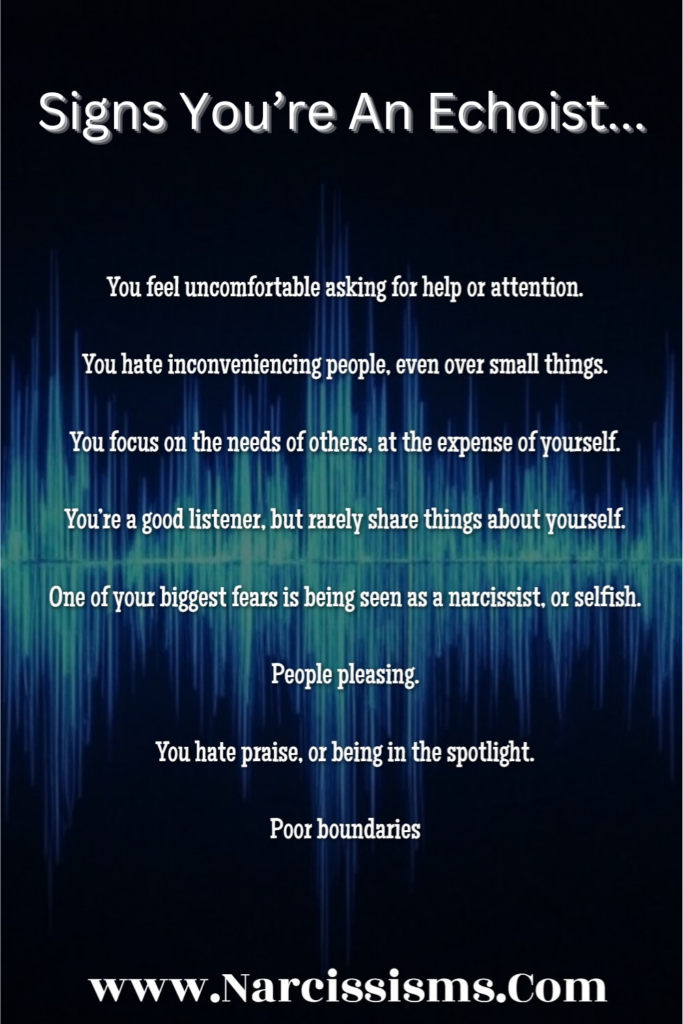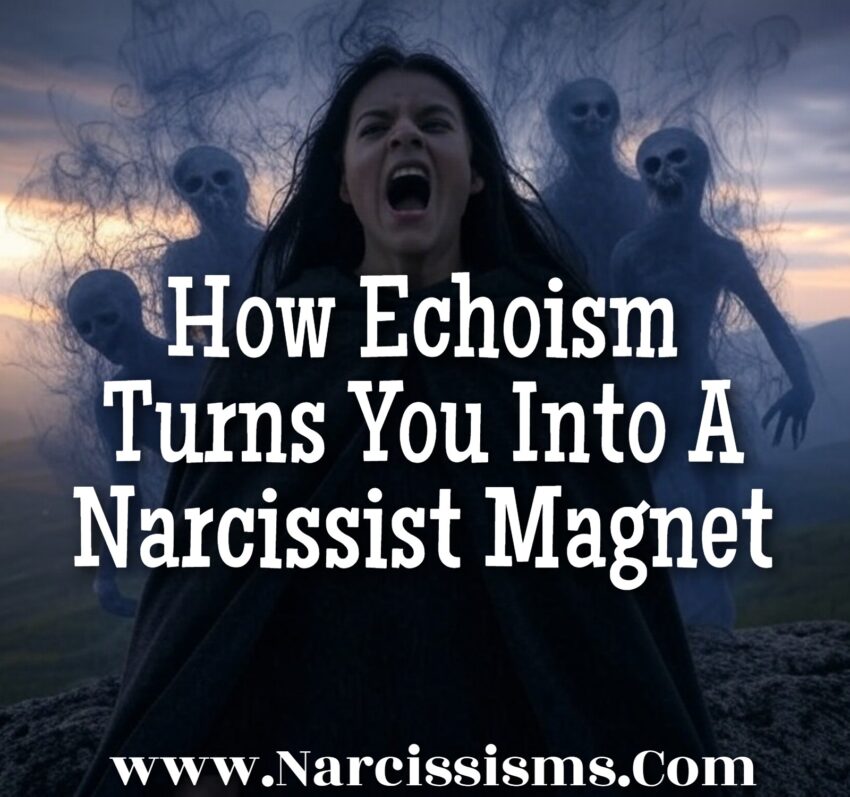Have you spent your life attracting narcissists? When one narcissist leaves your life, does another replace them?
Some people go through life without experiencing the delights of narcissists. Whereas others lives are filled with them. Why is this?
If you’re a narcissist magnet, then this might be explained by the relatively new term “echoism”…
Please Watch The Following Short Video To Aid Your Understanding…
What Is Echoism?
Echoism is almost the complete opposite of narcissism. It’s where someone shuns the spotlight. And feels uncomfortable receiving praise, or any kind of special treatment.
Echoists prioritise the needs of others, over their own needs. And may feel uncomfortable asking for help.
Some echoists take this further. They don’t even know what their own needs and wants are, because they never think about them.
These traits leave echoists in a constant state of anxiety and exhaustion. Because their needs are never met. Whilst they spend huge amounts of time and energy catering for others.
What Causes Echoism?
Echoism is usually caused by narcissist parents, echoist parents. Or both. Let’s take them in turn…
Narcissist Parents
Narcissist parents put their own needs before their children’s. And may shun their kids for having the front to ask for support.
Instead, they demand their children help them. And the child receives attention, and maybe even praise for this. So the child learns that to be “loved”, they must cater to their parents needs. And disregard their own.
So the child may listen to their narcissist parents problems. Do them favours. And be a rock for them. Yet never approach their parent when they need support. Even though they’re younger, and need it more.
This often leads to a life long habit of doing everything for others, whilst never asking for anything in return. Because they were trained for this from a young age.
Echoist Parents
Echoist parents demonstrate their echoist ways to their children, through their actions. Their child sees their parent making way for others. And may use this as a blueprint for how relationships work.
Some echoist parents coach their children to become echoists. And actively teach them to shrink into the background, and prioritise the needs of others. But this isn’t malicious. It’s because they genuinely believe this is the best way to maintain relationships.
Narcissist AND Echoist Parents
Some children have both a narcissist parent and an echoist parent. So they learn echoist thinking from both parents. Albeit in the different ways I’ve just discussed.
Having a narcissist AND echoist parent isn’t as rare as it may sound. Because narcissists and echoists attract each other. So it’s likely there’s many relationships like this.
Why Echoists Attract Narcissists
Echoists attract narcissists for obvious reasons. Narcissists want all the attention and resources. And they want to feel special at all times.
So they’ve hit the jackpot when they find an echoist who always puts them first. And who willingly gives them the spotlight.
Narcissists are happy to dominate relationships. And don’t feel a shred of guilt about it. So echoists are extremely attractive to them. Their holy grail. Because they can dominate the relationship with ease, with no real resistance.
Why Narcissists Attract Echoists
On the other hand, echoists feel guilty for asserting their needs. And feel uncomfortable when people do things for them. Or when they’re given the spotlight.
So they feel a strange sense of ease around selfish narcissists. Because they don’t get pushed into uncomfortable positions where they receive anything. So they don’t feel selfish or narcissistic.
Echoism Vs Codependency
Echoists can be confused with codependents, because both self sacrifice for the good of others. But there are important differences.
Codependents need people, but come from dysfunctional families. So they may have a fear of abandonment, that can only be settled by putting their needs aside. And trying their best to keep people happy around them.
Echoists don’t need people as much. They people please because it’s part of their identity. And they don’t want any attention or credit for it. They do it because it’s who they are. There’s no agenda other than not wanting to feel like a burden, or a narcissist.
Echoism Vs Introversion
Echoism and introversion also get confused. Because both prefer a quieter life, and both avoid noisy crowded places. But they avoid them for different reasons.
Introverts get exhausted from social interactions. Particularly bigger crowds. So they need time alone to “recharge” after they’ve been around people.
Echoists spend time alone because they fear reaching out to others. As they don’t want to inconvenience people. Or feel needy. So they may spend time alone, even when they don’t want to.
Signs You’re An Echoist
- You feel uncomfortable asking for help or attention.
- You hate inconveniencing people, even over small things.
- You focus on the needs of others, at the expense of yourself.
- You’re a good listener, but rarely share things about yourself.
- One of your biggest fears is being seen as a narcissist, or selfish.
- People pleasing.
- You hate praise, or being in the spotlight.
- Poor boundaries.
- Low self-esteem.
What To Do About It
Echoism isn’t a personality disorder or a mental health issue. It’s an adaptation to your environment. So you learnt this style of interaction, as it was once your best way to navigate the relationships around you.
Now you’re an adult, echoism no longer serves you. It holds you back. But luckily, since you learnt these traits, you can unlearn them.
Remind yourself that you deserve equal treatment to everyone else. As an echoist, you probably believed that everyone should get their needs met. So what makes you any different?
It may help to reframe this further. Ask yourself, “what makes me so special that I don’t need as much help as other people?”. This is a point worth pondering for a while.
Practice asking for help. Start small, and build up. Ask for small favours, such as a small loan, or to borrow an inexpensive item.
It may feel uncomfortable at first. But the more you do it, the more at ease you feel. And you may find that good friends actually jump at the chance to help you. Because you’ve denied them the opportunity for so long.
Remember, good people want to give back. And they too feel bad for taking without giving back.
The Difference Between Selfishness And Self Care
Narcissists often brand you as selfish if you assert your own needs and wants. But this is almost always untrue.
Selfishness is stepping on someone to get what you want. It’s dragging them down to lift yourself up. For example, bullying someone to come to a concert with you. Even though they don’t want to go.
Self care is doing something for yourself. Or turning down something that’s against your interests. For example, turning down an invitation because you’re ill or tired.
A narcissist may claim this is selfish. Because it denies them something from you. But you have no obligation to facilitate their needs. And it isn’t selfish if you’re not taking anything from them. It’s simply you putting your needs above theirs.
If you flipped the script, would you want someone to go somewhere with you, if they didn’t want to go? Of course you wouldn’t. That would be selfish. Which shows who the selfish one really is.
Final Thoughts
Relationships are about give and take. And they’re supposed to be mutually beneficial.
One way relationships aren’t real relationships. They’re one party using another. And unfortunately, predators sniff out echoists. And come flocking for as long as you meet their needs, without wanting anything in return.
So if you want narcissists and other toxic predators out your life, you must learn to put yourself first. Which is the right thing to do. Because ultimately we’re all our own number one priority. And everyone should respect this. Including you!

Please CLICK HERE For How Toxic Empathy Plays Into Narcissists Hands

I was raised by a narcissist mother and I married a narcissist man! I’m not sure what to do because I seriously can’t stomach my husband anymore. When my mother passed she was not speaking to me and left this world mad at me. My only thoughts were, she will never hurt me again. Now my husband is impossible to live with. It’s his way or else ! I could go on forever
Sadly it’s quite common to marry a narcissist after being raised by one. The same happened to me. Get out if you can! From my experience, life improved immeasurably since I left mine.